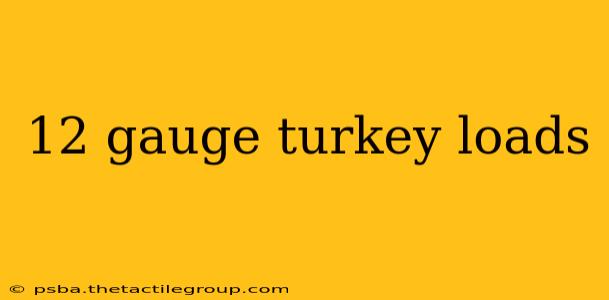Choosing the right ammunition is critical for a successful turkey hunt. A poorly chosen load can mean the difference between a clean kill and a wounded bird. This guide dives deep into the world of 12 gauge turkey loads, helping you understand the various options available and select the best one for your hunting style and situation.
Understanding 12 Gauge Turkey Shell Components
Before diving into specific loads, let's break down the key components that contribute to a successful turkey load:
Shot Size: The Heart of the Matter
Shot size is arguably the most crucial factor. Turkey hunters primarily use shot sizes ranging from #4 to #7. Larger shot sizes (like #4) offer more devastating power at longer ranges but often with less overall pellets per shell. Smaller shot sizes (#6 and #7) deliver a denser pattern at closer ranges, increasing the chance of hitting vital organs.
- #4: Excellent for longer shots (40+ yards), providing significant stopping power. Penetration is high, but pattern density can be lower.
- #5: A versatile option offering a good balance between range and pattern density. Suitable for shots within 30-40 yards.
- #6: Best for shots under 30 yards. Offers a dense pattern but may lack the penetration of larger shot sizes at longer ranges.
- #7: Similar to #6, with an even denser pattern at close range, ideal for shots under 25 yards.
Shot Type: Lead vs. Non-Toxic
Lead shot is still used, but many areas have restrictions or outright bans due to environmental concerns. Non-toxic alternatives such as steel, bismuth, and tungsten-iron are gaining popularity. Each offers different characteristics:
- Lead: Offers superior patterns and penetration, but its environmental impact necessitates compliance with local regulations.
- Steel: More affordable than other non-toxic options but can be less effective at longer ranges due to lower density. Requires adjustments to choke selection.
- Bismuth: A denser alternative to lead, offering comparable performance with less recoil. Pricier than steel.
- Tungsten-Iron: The densest option, delivering exceptional penetration and range. Significantly more expensive than other choices.
Choke: Fine-Tuning Your Pattern
The choke tube restricts the shot's spread, affecting pattern density and range. Choosing the right choke is essential to optimize your chosen shot size and load. Common choke choices for turkey hunting include:
- Extra Full: Provides the tightest pattern, best for long-range shots with larger shot sizes.
- Full: A good all-around choice offering a balance between range and pattern density.
- Improved Cylinder: Offers the widest pattern, ideal for very close-range shots.
Choosing the Right 12 Gauge Turkey Load for You
The best 12 gauge turkey load depends on several factors:
- Hunting conditions: Open fields require longer shots and therefore larger shot sizes and tighter chokes, whereas dense woods may necessitate closer-range shots with smaller sizes and more open chokes.
- Personal preference: Some hunters prefer the power of larger shot sizes, while others prioritize the dense patterns of smaller sizes.
- Your firearm: Always consult your firearm's manual to ensure compatibility with different shot sizes and choke configurations.
Beyond the Basics: Load Considerations
- Shell Length: 3-inch shells generally offer more pellets and increased range compared to 2 ¾-inch shells.
- Recoil: Heavier loads produce more recoil. Consider this factor, especially if you're new to turkey hunting or have sensitivity to recoil.
- Pattern Testing: Before heading out for your hunt, it's crucial to pattern your chosen load and choke combination at different ranges. This ensures you understand the capabilities of your setup.
Choosing the right 12 gauge turkey load is a crucial aspect of successful turkey hunting. Understanding the key factors discussed above, coupled with careful pattern testing, will greatly enhance your chances of bringing home a bird. Remember to always prioritize safety and follow all local hunting regulations.

